Newsletter
Sign up for The Wild
We’ll help you find the best places to hike, bike and run, as well as the perfect silent spots for meditation and yoga.
You may occasionally receive promotional content from the Los Angeles Times.
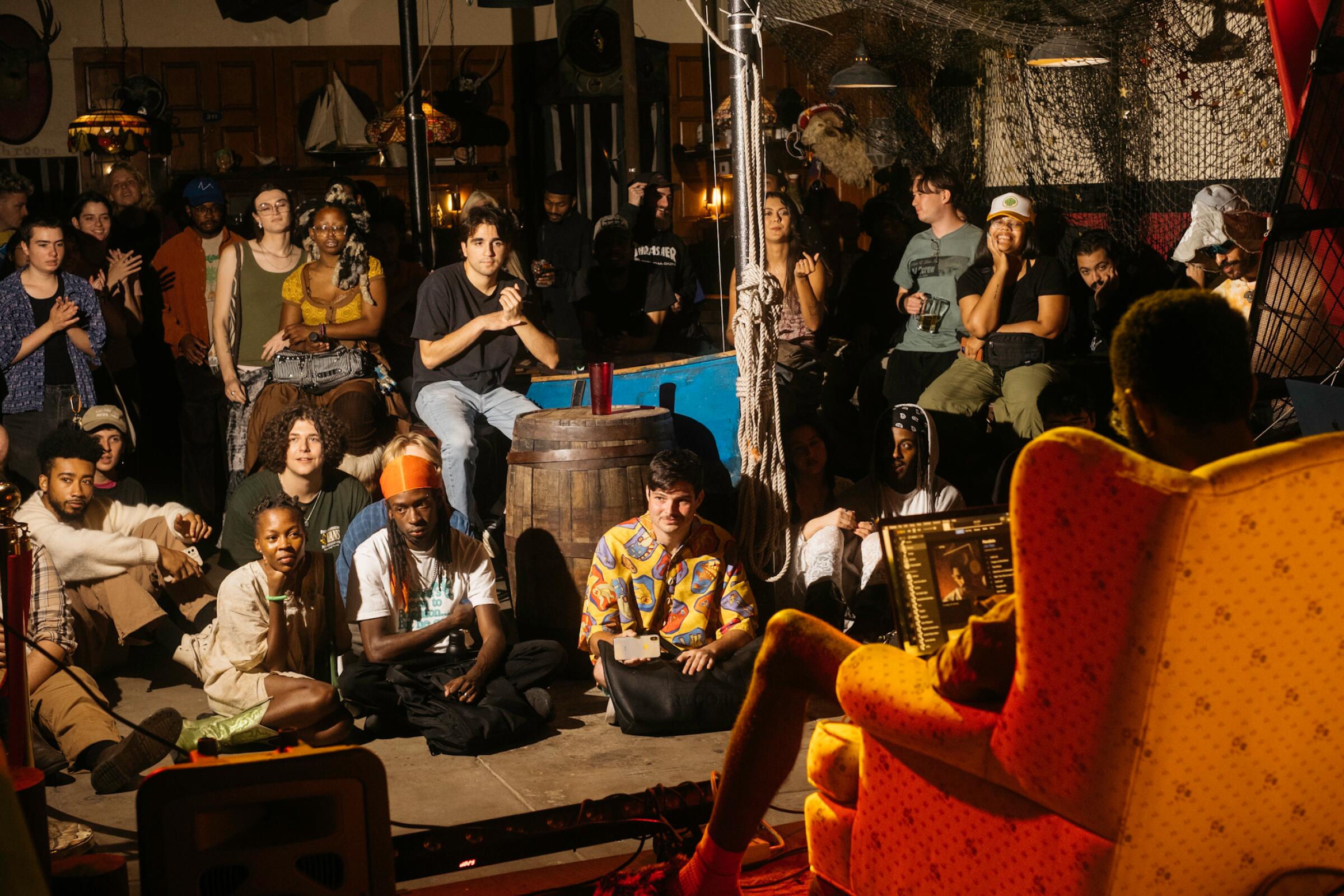
On an uncharacteristically rainy day in March, Orange County native Yousef Hilmy, founder and creative director of Minaret Records, stood outside the glass door of a nondescript venue in Mid-City. He greeted spectators with easy familiarity, guiding them into hugs and handshakes they weren’t aware they needed. His excitement to see them arriving, old friends and newcomers alike, was only rivaled by the potential energy of the growing crowd patiently, hungrily waiting for a jazz concert.
Hilmy is committed to building Minaret, the record label he founded in Los Angeles in 2019, into a beacon of the local jazz community — one that survives the simultaneous threats posed by government policies, economic recession and inaccessibility. For Hilmy, it’s critical that Minaret shows, which happen all over the city in traditional clubs and more do-it-yourself spaces alike, are affordable and accessible to all ages when possible. He is also determined to pay musicians better rates for shows and label releases than they might receive at a larger label.
Hilmy takes a hands-on approach to every show Minaret hosts. Before the doors open to see the band Adam O’Farrill’s Stranger Days one night, he zips through the venue adjusting lights, lighting incense, checking mics. Slowly, friend after friend drifts in to relieve some of the weight from Hilmy’s shoulders. They arrive wearing their Minaret sweatshirts and tees while balancing stacks of merch to sell with books, sitting out in the rain collecting tickets in support of a larger dream.
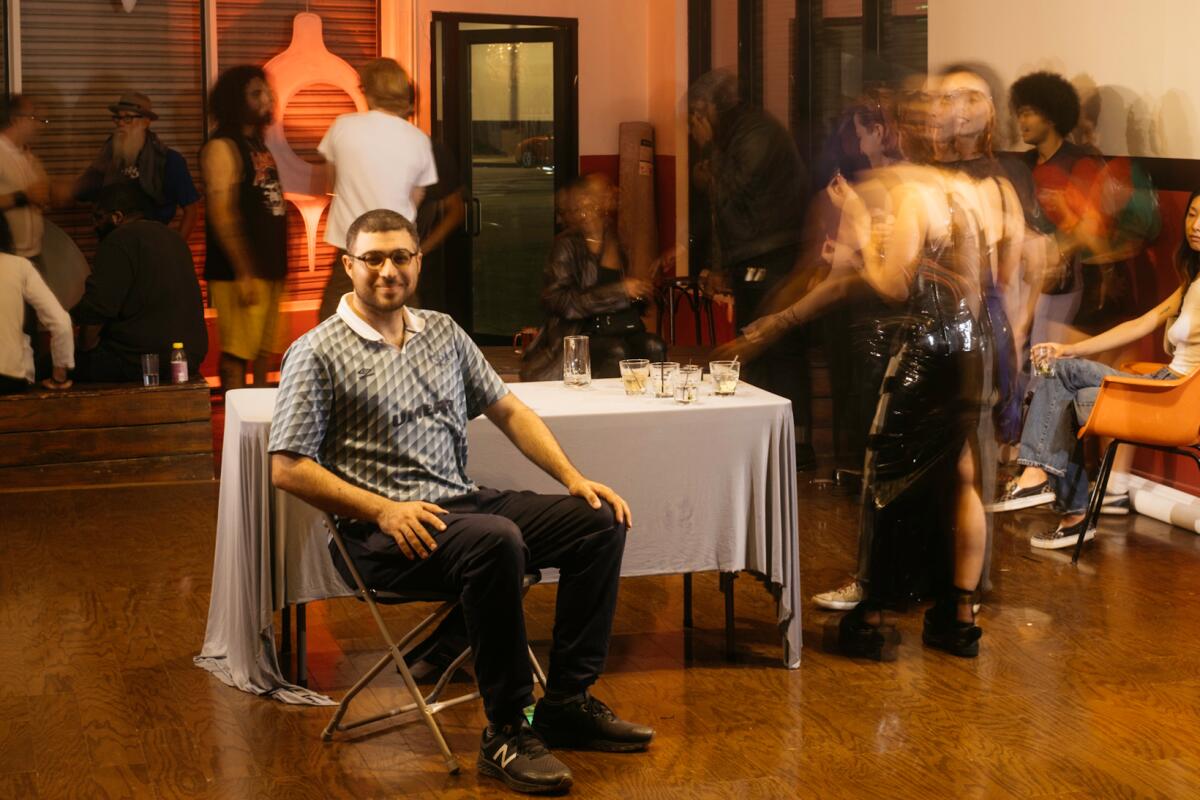
This is a fraction of the broader scope of work and network that has gone into supporting Minaret since Hilmy founded it. It’s something that Hilmy says will never change, “I just think it’s a philosophical choice. I’m not a musician, like, I’m not going on stage — right? Minaret is not me,” he says. “Minaret is every single person who’s musically defining what the sound is. It’s the people who are pulling up to shows.”
What Hilmy has been so successful in doing in Los Angeles and beyond — Minaret has thrown shows in New York; San Antonio; Portland, Ore.; Boston; Mexico City and more — is fostering a community. “He is kind of everywhere and such a presence, which he should be because it’s something that he’s built,” says jazz vocalist and bass player Maia Nelson. “But it does feel because you get to see the work, it connects you more to [Hilmy] and more to Minaret.”
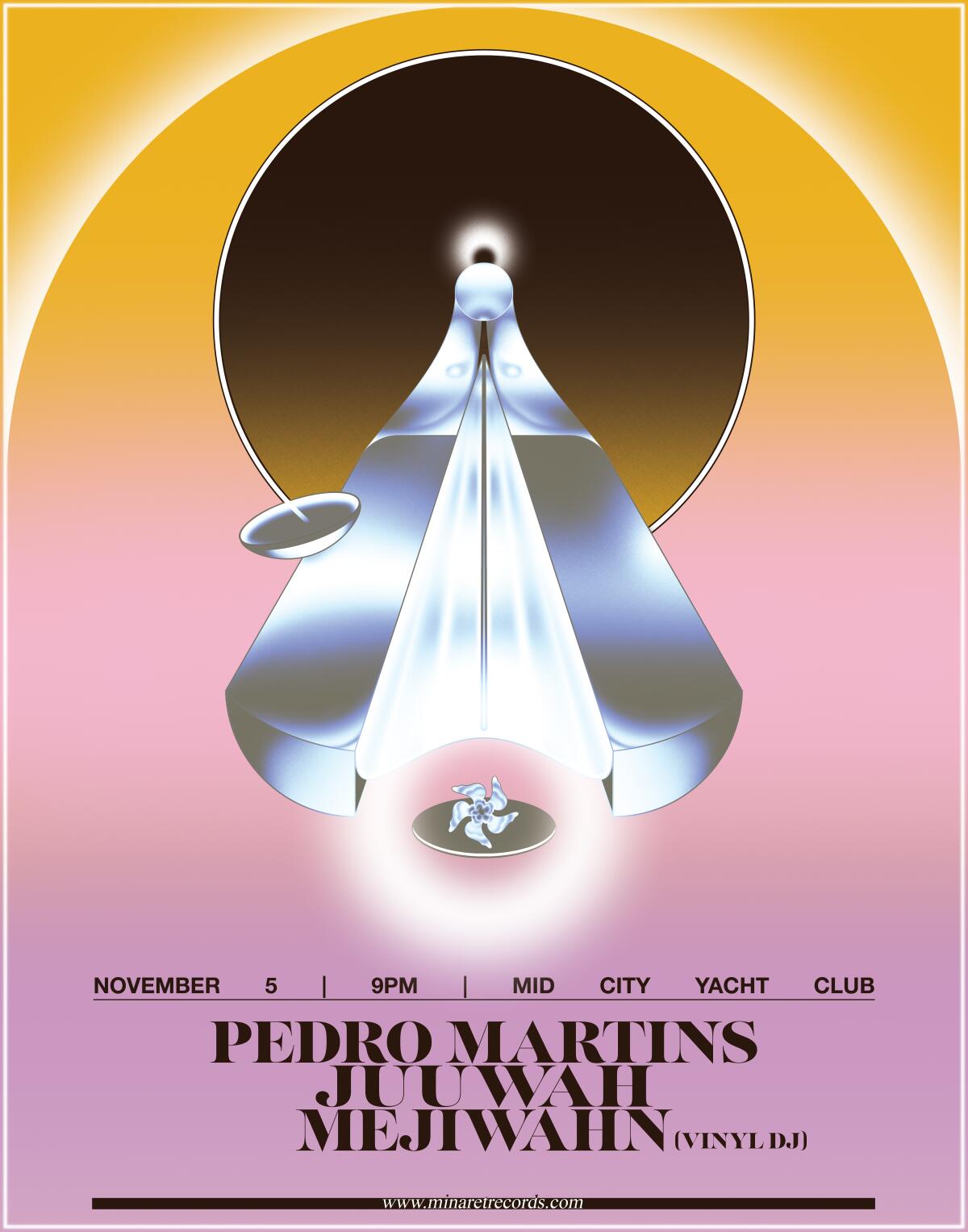
Minaret’s inception stemmed from a critique. “We weren’t inspired,” Hilmy says. “We were upset. We felt that the labels that did exist weren’t doing enough to service young folks or independent music.”
Hilmy’s interest in jazz is a progression of his long-standing passion for music. His parents are both Egyptian immigrants who have been living in Orange County for the last 30 years. With his parents and two elder brothers, Hilmy traveled to Egypt each summer, where he was exposed to MTV Arabia. By watching hip-hop and nu-metal music videos there, he soon had an exhaustive need to learn about and listen to more music, aided and abetted by his eldest brother.
Jazz never moves in one shape. As such, Hilmy doesn’t describe one singular introduction to the genre. As a teen experiencing ennui and sadness he would listen to Miles Davis and Bill Evans on YouTube. His love of hip-hop led him down the rabbit hole of samples, and in college he became hooked on Charles Mingus’ “The Black Saint and the Sinner Lady.” “This is different from players like high school jazz kids that know so much about jazz, we’re like, ‘This is insane,’” he says. “That’s knowledge that I had to learn more about and do my best to explore, because certainly no one taught me. I would say that my introduction is an ongoing one.”
At a performance for Jefferson High School students, an ensemble of musicians recalled an era when the neighborhood was a mecca for jazz greats.
Despite growing up in a diverse community in Orange County, Hilmy often found himself at the center of a cultural divide. “Whether it was about my Arab identity, because this is all post-9/11, we’re dealing with a lot,” he says. “My mom wears a headscarf. Even from my friends, [I faced] a lot of prejudice against Arab people and Muslim people.” Orange County raised him, but Hilmy couldn’t stay to make his ideas a reality. So after two years at community college he transferred to Brown University to pursue a degree in English.
Hilmy began laying the foundation for his reputation in Rhode Island. At Brown, he successfully co-opened the campus’ first student-run coffee shop, collaborated on the “Salafi Cowboy” project with Ibrahim Mimou, focused on his second passion of photography and contributed to Indy, a paper independently run by students at Brown.
Takoda, the first artist Hilmy signed, met him in an abandoned house in Santa Ana where Hilmy was making beats after returning from Rhode Island. Sitting in that house, their conversations turned to the idea of starting a jazz label that truly represented youth culture and paved a new extension to the genre’s once-alternative legacy that had since been dominated by the rich and powerful.
“Someone who is not a jazz musician giving this much of a care about jazz music in itself is a blessing to all of us,” says Takoda. “It’s purely [that Hilmy] actually sees jazz as this thing that needs healing and feels like he has the resources to do it. I don’t know anyone else who’s not a jazz musician who’s doing this much work for the jazz scene.”

As a result of his omnipresence, Hilmy has made enough friends to run a small business, although the superhero-style lineup of people ready to help him at a moment’s notice is surprising, even to him. The accelerated rate at which Minaret has grown since 2019 draws from the renewable resource of friendship, which has allowed Minaret the potential of growth even when the money isn’t there. Hypothetically, Minaret could exist as a private community thriving with the support of the people who respect Hilmy. But the ultimate goal is to create a space in which everyone involved has that support and respect.
Although Hilmy’s eye for curation is still central to the label, he now has a small troupe of people backing him, including two interns. AJ Reyes, a Minaret intern who is studying the jazz saxophone, gushes about Hilmy and the waves he’s making in the jazz scene as they collect tickets at the door one night at a Minaret show.
Word of mouth about the label, which has achieved cult status, has been contagious between attendees. Everyone at a Minaret show is there because they want to be there, in a room full of people listening. Part of that involves Hilmy’s care toward Minaret’s fliers and merch, all of which he curates. “I was extremely critical of contemporary jazz’s visual language,” he says. “I’d be like, ‘What the f— are these fliers? You guys are shooting yourselves in the foot with this flier. Like, it’s a dope bill. Cool. People are playing on it, and then you do some boring a— template?”
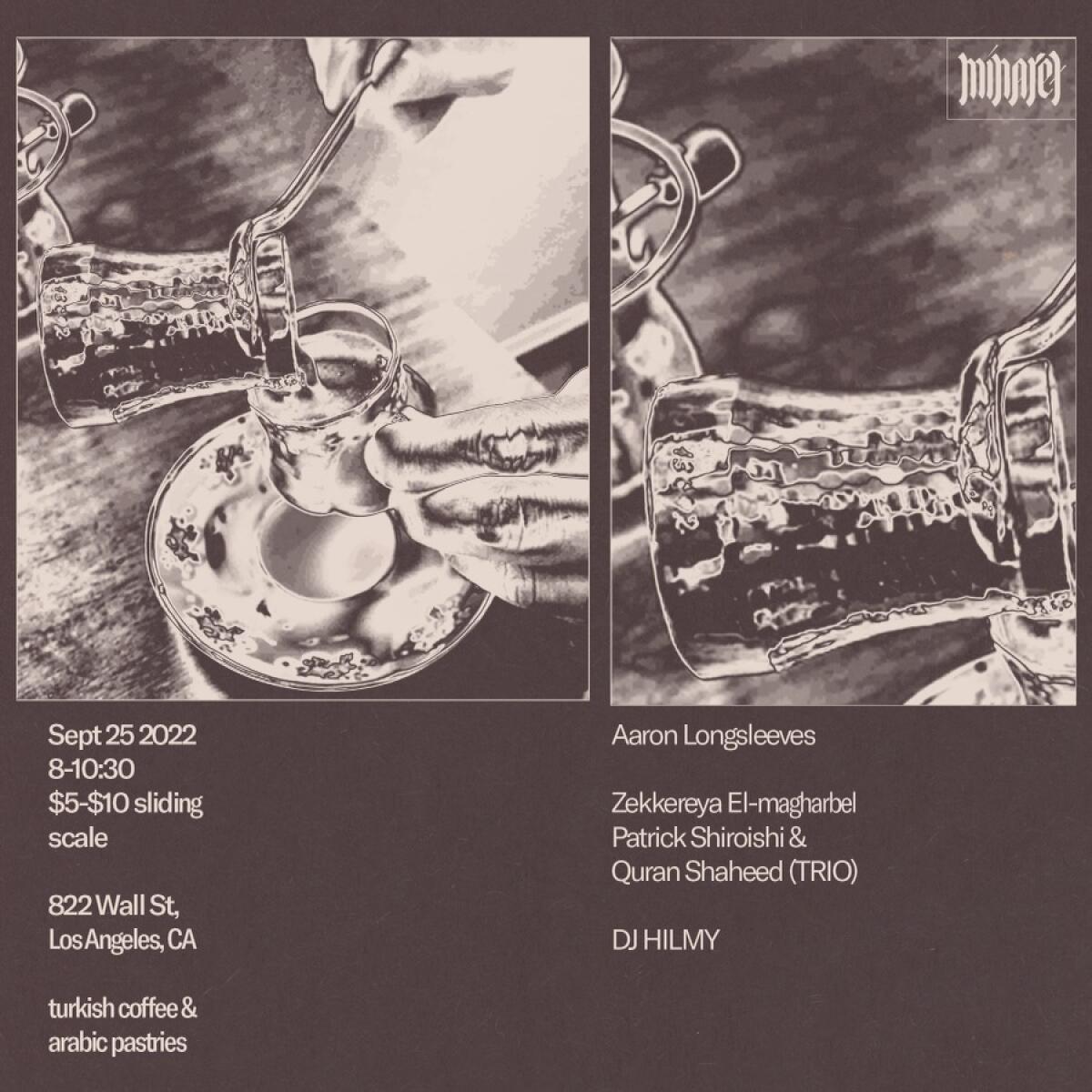
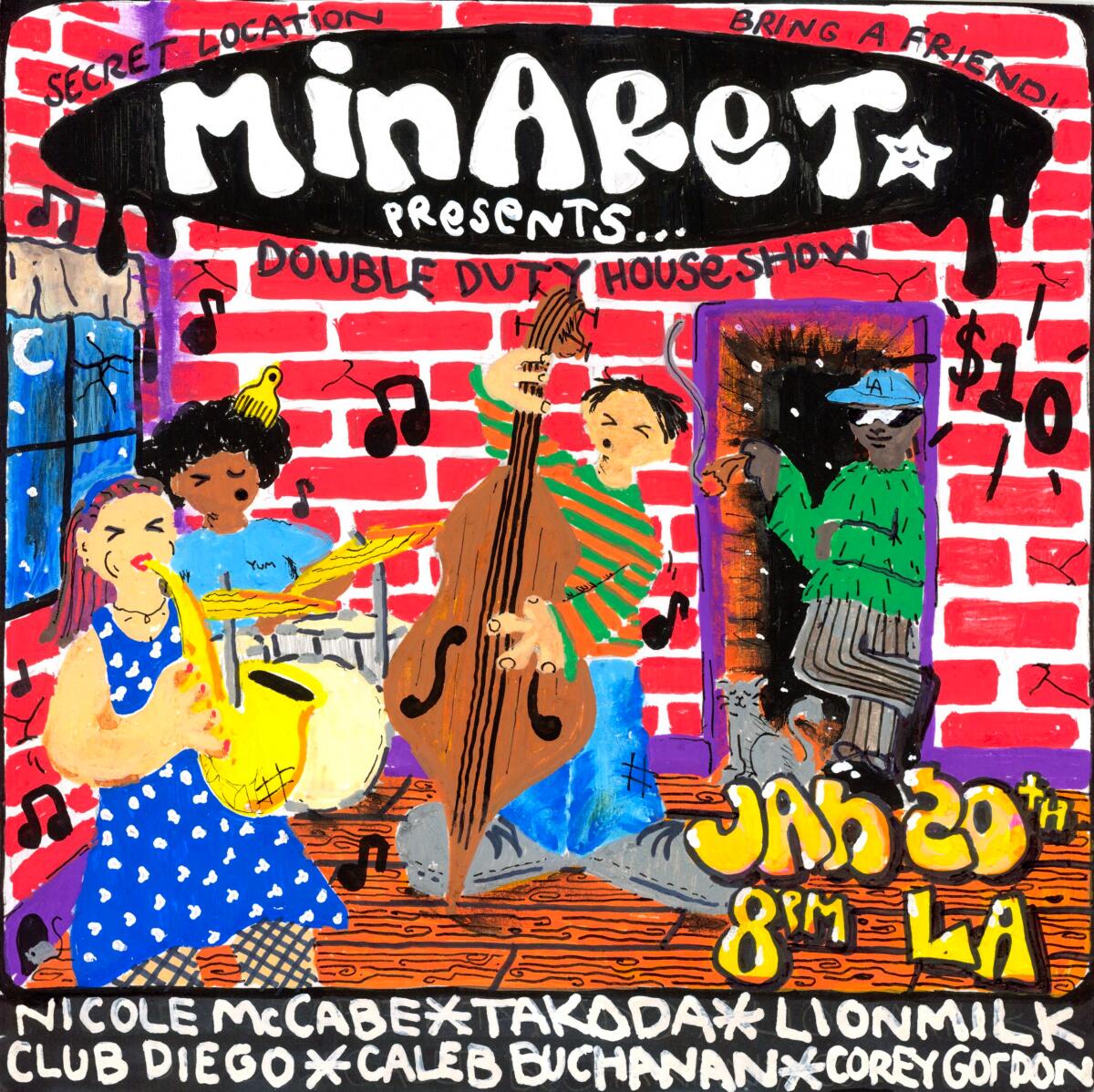
In September, Minaret hosted artist Maurice II (formerly Jon Bap) at the same venue in Mid-City. The club was empty save for Hilmy and the artist performing a sound check. Hotel room doors lined the maritime-themed venue, while its owner moved chairs into the perfect formation around preserved sailboats. The mismatched stained glass lamps lighted fish nets adorning the room softly with a red glow.
A second of eye contact with Hilmy reveals a brain moving at a mile a minute. At all times there is a Hilmy who is present and another who is putting out fires before they’ve started. Hilmy’s single-minded focus in ensuring Minaret’s viability shows no signs of waning. He wants more representation for women and queer people within Minaret, and he aspires for the label to participate in charity and education. Each year Hilmy’s plans get bigger and bigger, mirroring the bottomless demand for Minaret shows. Festivals and collaborations are in the works and demos submitted to the label are on backlog.
My bond with Fred Moten spans a nation of Black music. The music of collective improvisation mirrors the relationships in your life and your relationship to your own many-layered consciousness.
The intertwined fates of Minaret and Hilmy are much like notes within the flow of jazz — unpredictable but part of a larger story that will take shape in time.
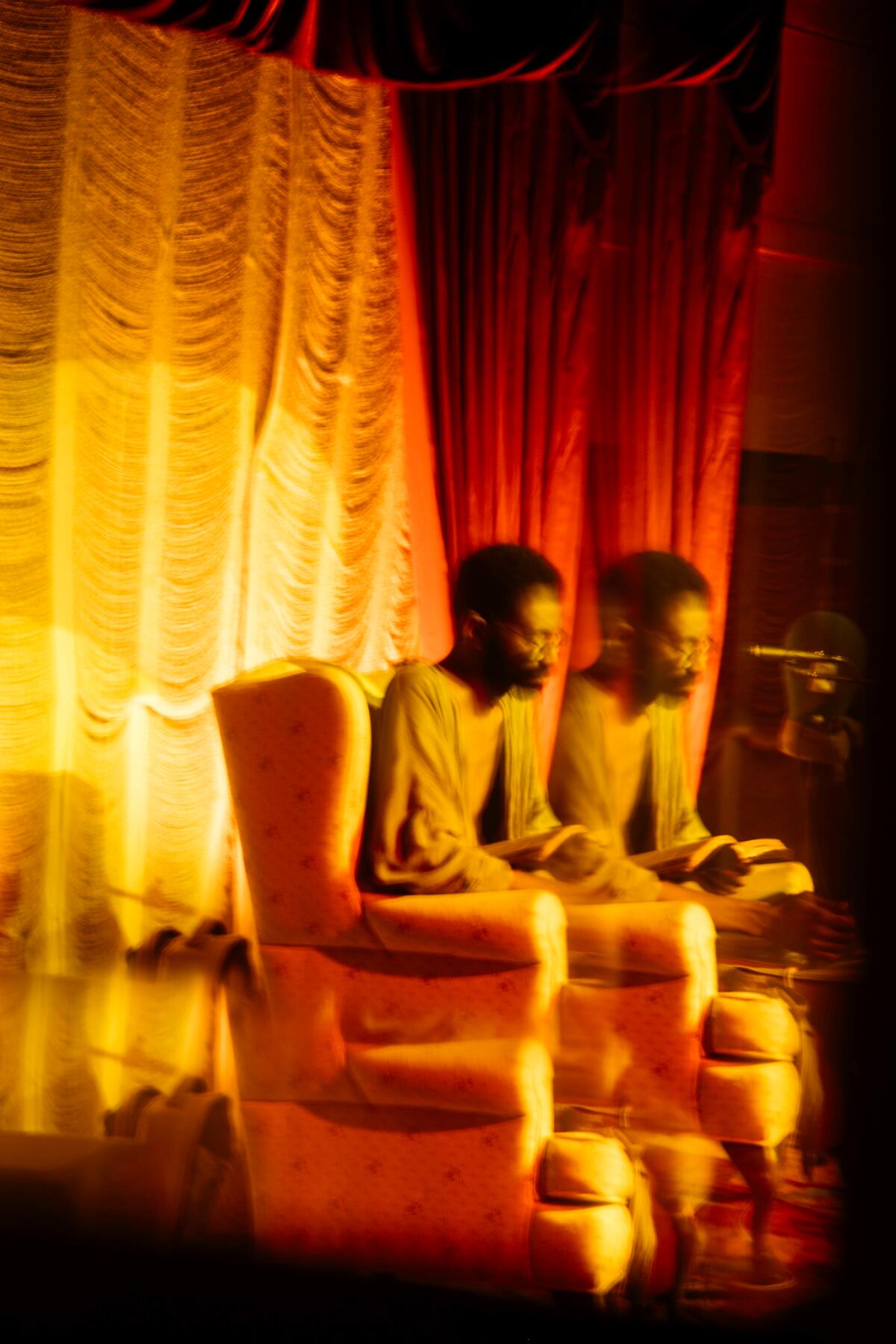
“Truly, it takes someone who’s crazy. It feels like he has unlimited energy for making stuff happen, and for grinding to help the music come out,” says jazz musician Henry Solomon, a friend and mentor to Hilmy. “There’s always someone in every generation that links it all together. In L.A. right now [Hilmy] is a super important person who’s making these shows happen that wouldn’t otherwise.”
Sign up for The Wild
We’ll help you find the best places to hike, bike and run, as well as the perfect silent spots for meditation and yoga.
You may occasionally receive promotional content from the Los Angeles Times.